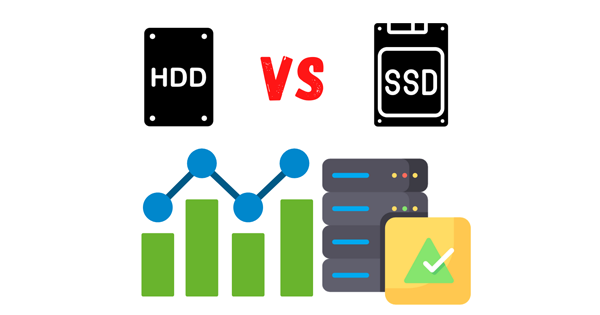
There has been a significant shift in the way web hosting providers store their user’s data.
Most web host users, due to their lack of technical know-how, sometimes don’t bother to get clarity from their hosting provider about the storage drive installed in their dedicated hosting server without realising how significant it is to choose the suitable server space while setting up your website.
In this article, we shall see what server space is offered by web hosting companies, i.e., the significant difference between SSD Vs HDD and the role each plays with regard to your website.
Role of Storage in Hosting
Let’s take an example-Imagine yourself in a big library, and each website you host is a book; therefore, to keep all your books accessible, you need a shelf, i.e., your web server and space on your shelf, i.e., storage space.
If a book in a library becomes popular for some reason, people will have demand for it, and therefore, you would need more copies, i.e., more storage to accommodate copies for all readers.
This type of shelf you would need depends upon demand from your readers and how much space the books take. Similarly, when your website grows, you will need an upgrade of your server in our example shelf.
However, the decision relies on the hosting you choose, like sharing a shelf (shared hosting) or having your dedicated shelf (dedicated hosting). It’s about choosing the right shelf (server) for your growing collection (website) to keep things operating smoothly.
Difference between HDD VS SSD
| Feature | Dedicated Server HDD | Dedicated Server SSD |
| Speed and Performance of
SSD vs HDD server |
HDDs use spinning disks and a moving head to read data, resulting in slower data access and transfer times. | SSDs have no moving parts, providing significantly faster data access and transfer speeds. They excel in read and write operations, enhancing overall performance. |
| Security and Reliability of SSD vs HDD Server | HDDs are susceptible to mechanical failures, especially in high-traffic scenarios, leading to data loss. | SSDs, being devoid of mechanical parts, are more reliable and secure. They have a lower risk of failure, reducing the chances of data loss even during high web traffic or for dynamic websites. |
| Versatility of
SSD vs HDD server |
HDDs are limited in versatility compared to SSDs. They rely on spinning disks and DDR3 memory chips. While HDD storage can be extended, it doesn’t match the flexibility of SSDs. | SSDs offer greater versatility with different types of memory cells and chips. Although HDD storage can be expanded, SSDs are considered more adaptable and are preferred for high-performance servers. |
| Power Consumption of
SSD vs HDD server |
HDDs consume more power due to the mechanical components involved in reading and writing data. | SSDs are more energy-efficient as they have no moving parts, leading to lower power consumption. In scenarios with numerous servers, this can result in significant energy savings. |
| Cost of
SSD vs HDD server |
HDDs are more cost-effective, making them a mainstream option for storage in dedicated servers. | SSDs are generally more expensive than HDDs. While their cost has decreased over time, they remain a premium option for users prioritising speed and performance over cost. |
Conclusion
Although HDD has been the most favoured choice due to its budget-friendly plans and storage due to the evolving and changing business environment, it is always best to focus on quality and go for SSDs, even though it can be an expensive choice.
